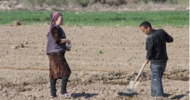A diplomatic intervention by the Indian government and law suits filed by the company appear to have pushed Ethiopian authorities to backtrack and offer a new lease in the Gambella region, this time for 15,000 hectares.
Pelo mundo, mais de 30 milhões de hectares foram adquiridos por apenas 490 proprietários. E o Brasil é um dos principais protagonistas.
La REDD+ et sa finance carbone ne résoudront pas la crise climatique
- La Flamme
-
13 November 2015
The REDD+ and its carbon trade will not resolve the climate crisis
- La Flamme
-
13 November 2015
Chinese entrepreneurs are going global ahead of officials. Countries with developed agriculture such as the US, Australia, Chile and Argentina have become their prime destinations.
- Global Times
-
22 January 2014
Against a backdrop of rising world wheat prices, the European Bank for Reconstruction and Development has chosen Kazakhstan as the destination for its first ever equity investment in farming.
- OCA Magazine
-
03 April 2012
The following report, by independent researcher Anna Bolin, explores the global trends and influences at work behind agriculture mega-projects like MIFEE in Papua.
- Down to Earth
-
30 November 2011
The traditional asset play on agriculture by Wall Street -- farmland -- has pushed to dizzying heights.
"With hungry countries desperately in need of food, Ukraine land certainly provides the vehicle for a strategic investment in soft commodities." Commercial pitch for foreign investment in Ukranian farmland.
Japan has steadily prepared for food security by buying 12 million hectares of croplands around the world, from Southeast Asia and China to South America. By comparison, the amount of Korea’s overseas croplands is negligible.
Una coalición de grupos hace un llamado urgente ante las autoridades de Etiopía y de India para que se cancele la concesión de nuevos contratos de arrendamiento de tierras a la compañía de agronegocios Karuturi Global.
“In these supposedly win-win contracts, I would like to know what our communities are gaining. On the contrary, we are losing and even dying a slow death.”
En Colombie, il y a environ 10 entreprises et familles qui ont bénéficié de l’accaparement des terres
- Invesig'action
-
02 July 2016
More than a quarter of all the meat produced worldwide is now eaten in China, and the country’s 1.35 billion people are hungry for more. In 1978, China’s meat consumption of 8 million tons was one third the U.S. consumption of 24 million tons. But by 1992, China had overtaken the United States as the world’s leading meat consumer—-and it has not looked back since. Now China’s annual meat consumption of 71 million tons is more than double that in the United States. With U.S. meat consumption falling and China’s consumption still rising, the trajectories of these two countries are determining the shape of agriculture around the planet.
“Los fondos que invierten en superficies agrícolas de países en desarrollo son muchas veces fondos de pensiones”
- Radio Nacional de Venezuela
-
16 February 2012
Outline of major Ukraine companies open to farmland investors
According to Steve Yuzpe, the CFO of Sprott Resource, ongoing population growth, dwindling arable land, water issues, even the falling yield productivity delivered by genetically modified seeds will be the big drivers for continued record demand—pushing food prices ever higher.
- Canadian Business
-
12 August 2009
As China becomes a large importer, its food security strategy calls for gaining control over imports from their source.
Karuturi Global Ltd, la multinacional india que hizo su fama en el mercado global de la industria de flores cortadas y que recientemente adquirió más de 300 mil hectáreas en Etiopía para producir alimentos para los mercados extranjeros, continúa su dolorosa e impresionante caída.
- TJN et al
-
13 October 2014
Once Kyrgyzstan joins the Eurasian Economic Union, due for early 2015 and so far consisting of Kazakhstan, Belarus and Russia, it will have both the obligation and a chance to allow investors from partner countries to lease its farmland.
- Times of C. Asia
-
18 February 2014
"I’ve put together a table with what I think are the main Swedish land investments in Russia and Ukraine," writes Brian Kuns. "In doing this, I ran into some of the known difficulties associated with monitoring the phenomenon of large-scale land-acquisition."
Global demand for soybeans has soared in recent decades, with China leading the race. Nearly 60 percent of all soybeans entering international trade today go to China, making it far and away the world’s largest importer.
Outback Australian farmers - hardened from dealing with extreme weather, fires and pests - now have to wrestle with modern trading tools and technology after a tough day tilling the land as they adapt to the rigors of a deregulated market.
It's a tsunami of land deals and, as all of the experts who have studied the phenomenon have agreed, no nation is truly prepared for its implications.
- CounterCurrents
-
17 June 2009
"We are seeing a land grab bigger than anywhere else in the world, and it has attracted a mighty cast of characters," says Kingsmill Bond, chief strategist at Troika Dialog, a Moscow brokerage firm.
- Institutional Investor
-
08 January 2009
A briefing paper from an international network documents that Indonesia’s new “Food Estate Program” on the islands of Borneo, Sumatra and Papua threaten Indigenous sovereignty, forests and biodiversity, will cause hunger and contribute to the climate crisis.
- Biofuel Watch etc.
-
04 Mar 2021
500 mil pessoas serão severamente atingidas, caso o Conselho de Ministros de Moçambique decida aprovar o chamado Projecto de Desenvolvimento do Vale do Rio Lúrio (DVRL).
500,000 people in northern Mozambique will be severely affected if the country's Council of Ministers approves the Lúrio River Valley Development Project (DVRL).
Farmers in Taraba State refuse to give up their lands for massive rice plantation project backed by the G8
- ERA/FoEN | CEED
-
28 January 2015
La multinationale indienne qui s'était fait un nom dans le secteur des fleurs coupées au niveau mondial et a récemment acquis plus de 300 000 ha en Éthiopie pour produire des denrées alimentaires à destination des marchés étrangers, poursuit son déclin douloureux et généralisé.
- TJN et al
-
13 October 2014















